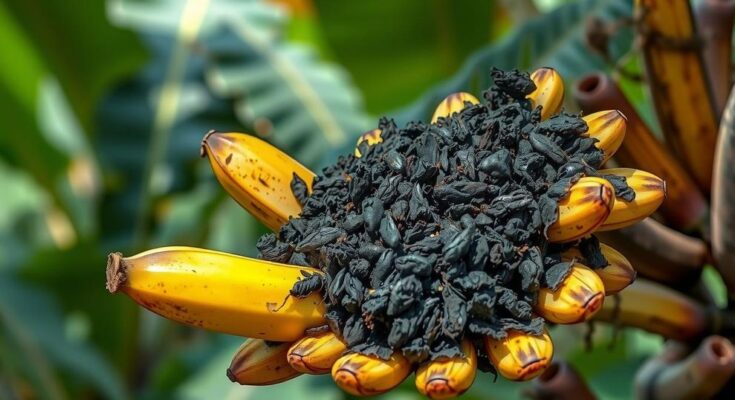In Cameroon, Steve Djeutchou is transforming banana peels into biochar, a sustainable charcoal alternative, to combat deforestation caused by traditional charcoal production. Despite the potential to collect significant amounts of organic waste, limited resources hinder larger-scale production. Additionally, his initiative includes a training school to educate the community about renewable energy, exemplifying a holistic approach to environmental sustainability and job creation.
In Cameroon, Steve Djeutchou is spearheading an innovative initiative to produce biochar from organic waste, particularly banana peels, as a sustainable alternative to traditional charcoal. His efforts aim to mitigate the detrimental effects of charcoal production, which contributes significantly to deforestation in the country. With an estimated potential to collect 40 metric tons of biomass daily in Yaoundé, Steve’s production of three tons of biochar monthly reflects both his commitment and the challenges of scaling this environmentally beneficial solution.
Steve’s innovative process utilizes carbonization technology he designed himself, transforming dried organic waste into an eco-friendly charcoal alternative. His biochar not only provides a less polluting fuel source but also aids in carbon sequestration, presenting a remarkable dual benefit in combating climate change. However, despite local interest and favorable pricing—biochar costs 250 francs per kilogram compared to 500 francs for traditional charcoal—resources are needed to increase production levels substantially.
In addition to his production efforts, Steve has established a training school focusing on renewable energy, aiming to empower the local community with skills in waste recovery and sustainable practices. Through this educational program, he has trained 400 individuals over the last four years, fostering a deeper understanding of renewable energy solutions vital for future sustainability in Africa. As Steve articulates, “All renewable energies are solutions for mitigating the effects of climate change,” underscoring his commitment to a healthier environment.
Cameroon faces significant environmental challenges, having lost over 700,000 hectares of forest between 2002 and 2020 due to rampant charcoal production. Steve’s initiative is part of a broader goal to address these issues while also promoting job creation within the renewable energy sector. As he advocates for better environmental practices, Steve’s vision aligns with the need for more localized efforts to transition towards greener energy alternatives, especially in Africa where the renewable energy job market holds enormous potential.
Steve Djeutchou exemplifies the role of innovative entrepreneurs in addressing environmental degradation while providing economic opportunities, and through his initiatives, he lays the groundwork for sustainable practices in Cameroon.
The increasing threat of charcoal production to the environment in Cameroon poses a significant challenge, with the country experiencing substantial deforestation. As a response, innovative solutions, such as converting organic waste into biochar, emerge as vital alternatives to combat this crisis while addressing economic constraints faced by local communities. Steve Djeutchou’s endeavors represent a critical convergence of sustainability and education, fostering local empowerment through skill development in the renewable energy sector. This initiative highlights the essential role of such innovations in mitigating the ongoing environmental degradation and promoting a greener future in Africa.
In conclusion, Steve Djeutchou’s pioneering work in producing biochar from banana peels offers a dual solution to combat deforestation while providing a sustainable energy source for local communities. His educational initiatives further support the development of local expertise in renewable energy, thereby promoting a healthier environment. As Cameroon and similar regions grapple with the pressing challenges of deforestation and climate change, innovative solutions coupled with community engagement are critical for sustainable progress.
Original Source: news.mongabay.com




